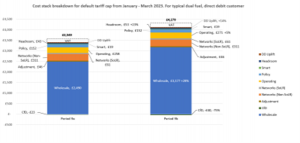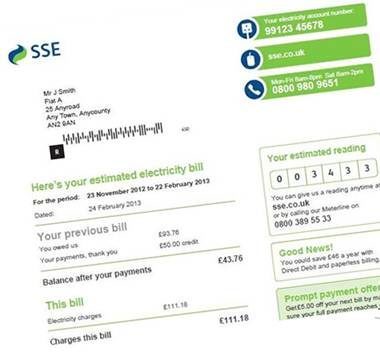Energy regulator Ofgem this morning raised to £4,279 the annual price cap for power and gas retailed to households. The new cap comes into effect on 1 January.
The announcement comes after chancellor Jeremy Hunt yesterday told the Commons’ Treasury committee that public support for energy bills – budgeted at £ 120 billion – must end in 2024. Britons must turn down thermostats to defeat Putin’s attack on Ukraine, Hunt told MPs.
Today’s quarterly uptick of the household price cap reflects Ofgem’s latest calculation of what an average home ought to be paying on a basic tariff via direct debit, while ensuring a ‘normal’ return for retailers faced with increased costs of gas feedstock.
Poorer customers on pre-payment meters will pay £80 more, the sum identified by Ofgem as suppliers’ extra costs of serving them.
Under law Ofgem is required to set a maximum price which suppliers can charge per unit of energy. As such it caps unit prices, not final bills. In August, the regulator doubled from half-yearly the frequency of its re-calculations of the cap’s level.
The price cap was introduced in January 2019, and now protects around 26 million customers, including 4 million on pre-payment meters.
Ofgem sets the cap on the basis of ‘typical domestic consumption’ of 2,900kWh of electricity, 12,000kWh of gas, and 4,200kWh of electricity for Economy 7 overnight rates. Its final calculations include VAT and standing charges.
Justifying the £4,279 figure, Ofgem released data on recent prices of gas, legacy generators’ most important cost line, on European markets. It also produced analysis of how the cost stack of retail supply to households will change in January:

Last week’s autumn statement , in effect Hunt’s emergency budget – confirmed that the government will continue to provide funds pinning notional average household bills to £3,000 per year from April. Bill-payers will still be protected by the Government’s Energy Price Guarantee until the end of March 2024,
For energy ministry D-BEIS, a spokesperson responded today to Ofgem’s move:
“The Energy Price Guarantee is protecting consumers from soaring energy costs, meaning people’s bills will not rise in line with today’s Ofgem energy price cap increase.
“A typical household in Great Britain will save around £900 this winter thanks to Government’s intervention to limit how much suppliers can charge per unit of energy, easing the burden on household incomes.
“This comes on top of a £400 discount for all households on their energy bills this winter, and last week we confirmed the Energy Price Guarantee will continue to protect the public for another 12 months from April”.
From analysts Cornwall Insight, principal consultant Craig Lowrey said full costs of the first 18 months of the EPG had leapt to £42 billion in only one week, posing new worries for the Chancellor.
“The Energy Price Guarantee (EPG) will shield consumers from the January price cap of £4,279 announced by Ofgem today” said Lowry.
“While the January price cap was locked in last week”, Lowry went on, “the rise in wholesale market prices has led to an increase in our price cap predictions from April 2023 onwards. With these increases passed on to the government through payments associated with the EPG, in just one week our estimate of the full cost of 18 months of the EPG has jumped from approximately £38bn to £42bn.
“This is even allowing for the increase in the EPG from £2,500/year equivalent to £3,000/year equivalent”.
“This highlights the nature of the wholesale market risk that the government is taking on by deciding to extend the EPG for longer than the March 2023 date announced by the Chancellor in October.
“Extending the EPG, even at an elevated level, has resulted in the government being exposed to variables and factors over which they crucially have no control. The risk is reduced by changing the level of support but remains acute”, concluded the Cornwall Insight expert.
Listed by Ofgem, multifarious government support available for consumers includes:
- the Energy Bills Support Scheme: a £400 non-repayable discount against millions of home energy bills started in October.
- Warm Homes Discount: 3 million low-income households benefitting from £150 support from the same date.
For pensioners & benefit claimants, support beyond the Energy Bills Discount includes
- a one-off £650 Cost of Living payment to 8 households on means-tested benefits
- a one-off Cost of Living payment for over 8 million pensioner households, to be paid alongside the Winter Fuel Payment
- £150 for six million people eligible for some disability benefits
- £500 added to the Household Support Fund




